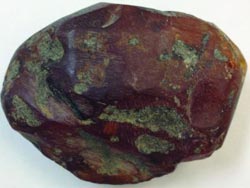20-Million-Year-Old Amber Shatters Theories of Glass as a Liquid

<br>
“Glass transition is related to the performance of materials, whether it is inorganic glass or organic polymers,” said Gregory McKenna, professor of chemical engineering at Texas Tech. “For example, this would be important to people who own a boat made of fiberglass, or fly in an airplane made with epoxy-based composites. Information like that can help predict if that jet will still be flying in 30 years.”
The idea for this research came from a doctoral student’s qualifying exam, McKenna said. He gave Jing Zhao a problem relating to diverging time-scales using polyvinyl acetate, a substance often found in adhesives. Her results were consistent with a lack of divergence – contrary to received thought. So they decided to up the ante by performing similar experiments on a much older, ultra-stable glass.
They chose 20-million year old Dominican amber, and together with Whitacre Department Chair and Horn Professor Sindee Simon, Zhao performed calorimetric and stress relaxation experiments on the samples.
“What we found is that the amber relaxation times did not diverge,” McKenna said. “This result challenges all the classic theories of glass transition behavior.”
This research is supported by the National Science Foundation under a grant from the Division of Materials Research, Polymers Program. The process and results were recently published in Nature Communications.
Meanwhile, McKenna has recently acquired additional samples from around the world, including 220-million-year-old Triassic amber from Eugenio Ragazzi, a pharmacology professor at the University of Padova in Italy. The team now has plans to perform similar experiments on the new samples.
“We are in the very early stages,” McKenna said. “However, our research definitely is ‘to be continued.’”
CONTACT: Greg McKenna, Horn Professor and John R. Bradford Chair in Engineering, Whitacre College of Engineering, Texas Tech University, (806) 742-4136 or greg.mckenna@ttu.edu
Media Contact
More Information:
http://www.ttu.eduAll latest news from the category: Materials Sciences
Materials management deals with the research, development, manufacturing and processing of raw and industrial materials. Key aspects here are biological and medical issues, which play an increasingly important role in this field.
innovations-report offers in-depth articles related to the development and application of materials and the structure and properties of new materials.
Newest articles

Bringing bio-inspired robots to life
Nebraska researcher Eric Markvicka gets NSF CAREER Award to pursue manufacture of novel materials for soft robotics and stretchable electronics. Engineers are increasingly eager to develop robots that mimic the…

Bella moths use poison to attract mates
Scientists are closer to finding out how. Pyrrolizidine alkaloids are as bitter and toxic as they are hard to pronounce. They’re produced by several different types of plants and are…

AI tool creates ‘synthetic’ images of cells
…for enhanced microscopy analysis. Observing individual cells through microscopes can reveal a range of important cell biological phenomena that frequently play a role in human diseases, but the process of…





















